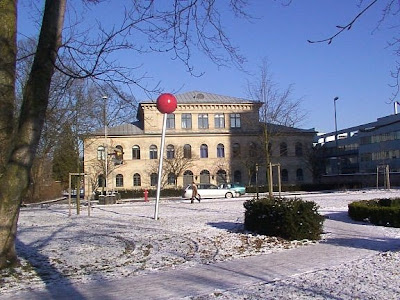From time to time, I have posted articles or translations concerning Erlangen, Germany, the town outside Nuremberg where I spent my military service time, 1966-68. Mostly, the articles concern Erlangen's history during the Third Reich and how the town commemorates that dark period. In that vein, I have previously written about the Erlangen Sanatorium and Nursing Home (HuPfla) and its role in the euthanasia (murder) of almost 3,500 sick or mentally handicapped patients during the years, 1940-41. This was part of the Aktion T-4, named after the address of the building where the planning and direction of this program were carried out (Tiergartenstrasse 4, Berlin). The purpose of this action was to rid Germany of those who were mentally disabled, physically deformed, or considered as "life unworthy of life" or "useless eaters".
In recent years, the Erlangen Sanatorium has been largely torn down to make room for more modern health centers. Due to a long debate about maintaining historical monuments, part of the center has been left standing in commemoration of the victims.
Much of this is described in my own history of Erlangen, "Erlangen-an American's history of a German town" (University Press of America, 2005).
Below is a translation of an article in the Erlanger Nachrichten which is translated by Fousesquawk.
Exhibition at the savings bank
Memory of dark times: Exhibition of "Grey buses" in Erlangen focuses on Nazi euthanasia
August 15, 2024 at 13:26
Caption: The artists, Andreas Knitz and Horst Hoheisel, created the "Memorial to the grey buses" out of concrete. It is to remember the transport with grey-painted buses, which on the orders of the Nazis, transported people to the killing centers. (Inscription: "Where are you taking us?" 1940-41.)
Erlangen- Since February 6 on the Huguenottenplatz, a concrete bus commemorates the victims of the Nazi murders of the sick from Erlangen. The accompanying exhibition in the savings bank can be seen till September 6 and illustrates the terrible transports.
A concrete bus commemorates the victims of the Nazi murders of the sick, among others, from the Erlangen Sanatorium and Nursing Center. In order to remember the Nazi euthanasia crimes, the artists, Horst Hoheisel and Andres Knitz, have recreated the autobuses, in which the patients were taken to killing centers as part of Action T-4. Since 2007, such a bus stands permanently in front of the former Ravensburg-Weissenau Sanatorium in Baden-Wuerttemberg. A second bus changes its location and has has been already viewed in 19 locations in Germany. What they symbolize is that in the years 1940-41, buses were driving through the country, visible to all, and picking up people and taking them to their murders.
905 people taken from the (HuPfla) Sanatorium and Nursing Home and killed
905 patients were taken from the Erlangen Sanatorium and Nursing Home-mostly by train- and murdered at the Pirna-Sonnenstein and Hartheim (near Linz) killing centers. In addition, in Erlangen, between 1939 and 1945, over 1,900 patients died, including some 700 as a direct or indirect result of malnourishment and structural neglect. With the temporary erection of the memorial till the end of 2024, the city of Erlangen remembers the victims.
Currently, a comprehensive concept for a site for remembrance and the future in Erlangen is being worked out by the Friedrich-Alexander University Erlangen-Nuremberg and the city of Erlangen. The art activity in Erlangen will be accompanied by events focusing on the theme of the Nazi euthanasia, and will report on further development of memorial sites in Erlangen. That also includes the traveling exhibition, "Memorial to the grey buses" designed by the artists Hoheisel and Knitz, which (describes) the historical background and the various sites.




















No comments:
Post a Comment